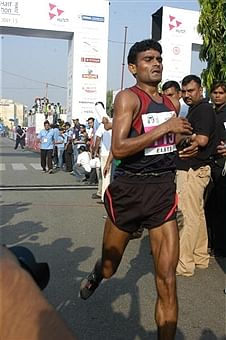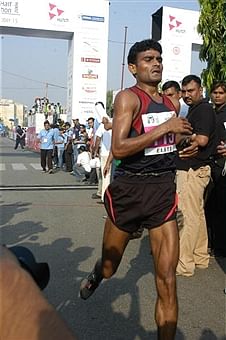
What drives a runner: Do you run away from or run towards something?
You’ve heard of Lance Armstrong, multiple time Tour De France winner. He has beaten the odds on and off the track. You may not know that he also ran a couple of marathons. First he finished it in 3 hours in 2006 and the next year he ran a marathon in 2 hours and 46 minutes. He called the experience “without a doubt the hardest physical thing I have ever done.”
Coming from one of the most extreme endurance athlete of all time, that should put into perspective what running a marathon is like.
India will be sending one lone runner in the marathon in the London Olympics, Ram Singh Yadav. Unlike most of our Western counterparts, a lot of Indians don’t take up sports professionally simply for the love of the sport or the glory they can earn for their country.

Why do you think Ram Singh Yadav took up running? That too running the most punishing race in the Olympics?
Ram Singh said “Athletes don’t come from very well-to-do backgrounds. One fine day I decided to pursue athletics and ran a couple of races. When my family heard of it, I had to tell them that this was what I wanted to do in order to earn money to take care of their needs.”
https://www.sportskeeda.com/2012/08/07/ram-singh-yadav-the-second-indian-to-make-the-marathon/
You’ve heard the line, every morning a cheetah wakes up and knows it has to run. Run faster than the deer if it wants to fill its stomach. They say that poverty and hunger make for high achievers. That’s often the case in a country like India. What we lack is a system to harness all that potential.
“Itna hi pata hai, aage daude to bhala hai. Peeche rakshas daude boo!”

Bhag
Run. It’s that simple. The main appeal about long distance running is its simplicity. Put one foot in front of another. Rinse. Repeat. What drives a long distance runner though is a lot less simple. Is it the carrot or the stick? Or a mix of both?
Lance Armstrong grew up in a one parent home. Financials were a problem for them. Here’s his secret on becoming an endurance athlete:
“What makes a great endurance athlete is the ability to absorb potenial embarrassment, and to suffer without complaint. I was discovering that if it was a matter of gritting my teeth, not caring how it looked, and outlasting everybody else, I won. It didn’t seem to matter what sport it was–in a straight-ahead, long-distant race, I could beat anybody. If it was a suffer-fest, I was good at it.”
His hunger drove him. He needed to be the best. To outlast the competition. He was running away from the constraints which he and his mother were bound by.

Old joke about how to swim fast. Just put a croc behind you and watch yourself blast ahead. Swim away from the beast behind you. Normally you would expect people to excel in things for the love and joy of it. If you enjoy something then you tend to take a interest in it and get better at doing it because your interest makes you curious about its mechanics and drives you to move ahead.
To fulfill an economic goal, you need to earn money. But not everyone chooses to take up sports to escape that vicious circle of poverty. It’s often a case of last resort for them. Hunger and poverty often drive people just as much as dreams do.
So which is it? Why do you run? Do you run for something or are you running away from something? I ran the Mumbai marathon this year in 3:30, an hour better than my timing two years ago, and I’m still unsure on what drives me. Will find out though.
Watch this space for features on what it’s like to run for something and run away from something.